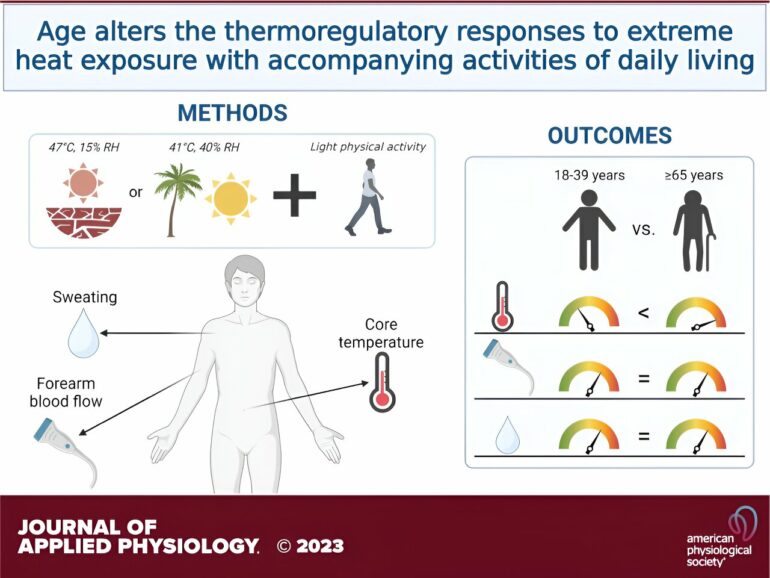Under conditions designed to better mirror real-world conditions, a new study finds that adults 65 and older are affected more by heat wave–like temperatures than previously reported. The study, “Age alters the thermoregulatory responses to extreme heat exposure with accompanying activities of daily living,” is published ahead of print in the Journal of Applied Physiology.
The research team introduced intermittent bouts of light activity into the study to account for the effects of daily living, such as cooking, cleaning or carrying groceries. They also closely monitored the volunteers’ hydration levels to remove the cofounding factor of dehydration from the results.
In the study, two groups of healthy adults—one between ages 18 and 39 and the other age 65 and older—completed two separate experimental heat simulations. Participants first rested for an hour in a temperate environment (~72° F, 40% humidity) while researchers collected baseline data. The adults then entered a temperature- and humidity-controlled environmental chamber for three hours.
While in the chamber, the participants performed seven five-minute rounds of either cycling or walking at a pace that replicates the light physical activity associated with daily living. For one of the simulations, the chamber was set to about 116° F and 15% humidity to emulate the conditions of the 2018 Los Angeles heat wave. The other was set to about 106° F and 40% humidity to emulate the 1995 Chicago heat wave.
While the older adults had similar skin blood flow and sweat rates as the younger group, they also had “an approximately twofold greater increase” in core body temperature. Accounting for this greater change in core temperature reveals that the older adults’ sweat and skin blood flow responses did not respond adequately to maintain a healthy body temperature.
This method of mimicking daily life during a heat wave “resulted in greater thermal strain than what has been previously reported in the literature during similar heat exposures,” researchers report.
More information:
Zachary J. McKenna et al, Age alters the thermoregulatory responses to extreme heat exposure with accompanying activities of daily living, Journal of Applied Physiology (2023). DOI: 10.1152/japplphysiol.00285.2023
Provided by
American Physiological Society
Citation:
Older adults show greater increase in body temperature in simulated heat wave than previously reported (2023, September 26)



